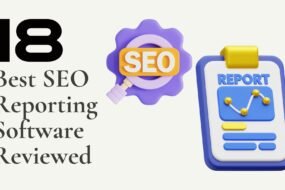
Search Engine Optimization, or SEO, has become a major part of any digital strategy. But let’s face it—SEO is complex, and it takes time. Managing keywords, building backlinks, tracking rankings, and analyzing data can feel like a never-ending to-do list. That’s where automated SEO tools come in. These tools help make SEO easier by handling repetitive tasks, letting you focus on strategy rather than getting lost in the details. And as we head into 2025, SEO automation is only getting more advanced.
In this blog, we’ll look at what automated SEO tools are, the key tasks they can handle, and the benefits they offer. We’ll also explore the top 14 automated SEO tools for 2025, discussing what makes each of them unique. Finally, we’ll look at some of the limitations and challenges of using SEO automation, because no tool is perfect. Ready to dive in? Let’s get started.
What Are Automated SEO Tools?
Automated SEO tools are software designed to make SEO easier by handling a lot of the repetitive and time-consuming tasks involved in optimizing a website for search engines. These tools use advanced algorithms to analyze data, find opportunities for improvement, and even make recommendations. While you still need a good understanding of SEO principles, automated tools help by doing much of the legwork, so you don’t have to do everything manually.
Think of automated SEO tools as digital assistants for your website. They’re constantly working in the background, scanning for issues, tracking rankings, identifying keyword opportunities, and keeping tabs on your competitors. All you have to do is set up the tool according to your needs, and it starts working automatically. In short, they save you time, increase accuracy, and give you valuable insights into your website’s performance.
What Are The Key SEO Automation Tasks?
So, what exactly can you automate with SEO tools? Let’s go over some of the core tasks these tools can handle:
- Keyword Research: Finding the right keywords is a huge part of SEO, and automated tools make this easy. They can suggest keywords based on your niche, show search volume, and even highlight keywords your competitors are ranking for.
- Rank Tracking: It’s essential to know where you stand on search engine results for your target keywords. Automated tools monitor your keyword rankings over time and provide daily or weekly updates.
- On-Page Optimization: Optimizing your website’s content is crucial. Automated tools check for factors like keyword usage, meta elements like meta descriptions, title tags, and header tags to ensure your pages are well-optimized.
- Backlink Analysis: Backlinks are an important ranking factor in SEO. Automated tools help track who is linking to your site and analyze the quality of those links. They also monitor your competitors’ backlinks, showing you new opportunities for link building.
- Site Audits: Regular site audits help ensure your website is technically sound. Automated SEO tools scan for issues like broken links, duplicate content, slow loading speeds, and more. These audits provide detailed reports with suggestions for improvement.
- Competitor Analysis: Knowing what your competitors are doing can give you a big advantage. Automated tools track your competitors’ rankings, keywords, and backlinks, giving you a clear picture of their SEO strategy.
- Reporting and Analytics: Reporting is a big part of SEO, especially if you’re managing multiple clients. Automated tools generate easy-to-understand reports that show progress over time, helping you make data-driven decisions.
These tasks are essential to a good SEO strategy, and by automating them, you can save hours each week. Now, let’s look at the benefits of using automated SEO tools.
What Are The Benefits Of SEO Automation?
Why should you consider using automated SEO tools? Here are the main benefits:
- Saves Time: Manual SEO tasks are time-consuming. For example, checking your website’s rank on various search engines for different keywords or manually analyzing backlinks takes hours. Automated tools do this in minutes, saving you time for more strategic tasks.
- Improves Accuracy: When you’re doing repetitive tasks, it’s easy to make mistakes. Automated SEO tools don’t suffer from human error. They follow a set of rules and deliver data-driven insights, which makes them highly accurate.
- Provides Consistency: One of the best things about SEO automation is that tasks are done consistently. For instance, rank tracking can be scheduled to run every day or every week without you having to remember it. This consistent approach ensures you never miss important insights.
- Generates Reports Easily: Most automated SEO tools offer built-in reporting features. Whether you want to track your progress or share insights with clients, these tools generate easy-to-understand reports, sometimes even with customizable options to focus on specific metrics.
- Helps in Better Decision Making: With automated SEO tools, you get detailed reports and analyses that can help guide your SEO strategy. For instance, they can show you which keywords are performing well, where your backlinks are coming from, and what technical issues need fixing. This data helps you make more informed decisions.
Top 14 Automated SEO Tools For 2025
Now, let’s dive into the top 14 automated SEO tools you should consider for 2025. Each tool has unique features, so let’s explore what makes them stand out.
1. Ahrefs
Ahrefs has earned a reputation as one of the most powerful SEO tools on the market. This all-in-one tool offers everything from keyword research to backlink analysis and site audits, making it a favorite among SEO professionals. Ahrefs is known for its extensive backlink database and robust keyword research capabilities, allowing you to dive deep into your SEO strategy.
Key Features:
- Backlink Analysis: Ahrefs has one of the largest backlink databases, making it easy to track who’s linking to your site, analyze link quality, and find new link-building opportunities.
- Keyword Explorer: Ahrefs’ Keyword Explorer provides detailed insights into search volume, keyword difficulty, click-through rates, and keyword trends. You can also see related keywords, questions, and search phrases to help expand your content strategy.
- Site Audit: Ahrefs automatically scans your site for technical issues like broken links, duplicate content, and slow loading speeds, then provides recommendations for fixing these issues.
- Content Explorer: This feature lets you find popular content in your niche by showing trending topics, which you can use to generate new content ideas.
Why Use Ahrefs?
Ahrefs is ideal for marketers focused on content creation and link building. It provides in-depth insights into backlinks and keywords, making it a valuable tool for understanding your audience and outperforming competitors.
Pros:
- Comprehensive backlink data
- Powerful keyword research tools
- Easy-to-use interface
- Regular updates and a responsive support team
Cons:
- Higher price point compared to some other tools
- Learning curve for beginners
2. SEMrush
SEMrush is another all-in-one tool that’s popular for its wide range of SEO and digital marketing features. This tool is known for its keyword research, rank tracking, competitor analysis, and site audits. SEMrush also has additional tools for social media management and paid advertising, making it a great option for businesses looking to manage all aspects of digital marketing from one platform.
Key Features:
- Keyword Research and Tracking: SEMrush provides keyword difficulty scores, search volume, and competitive analysis, along with tracking features to monitor your rankings over time.
- Site Audits: The site audit feature automatically scans your website for common SEO issues, such as broken links, slow load times, and mobile compatibility.
- Competitor Analysis: SEMrush lets you see your competitors’ keywords, backlinks, and ads, giving you insights into their SEO and marketing strategies.
- Social Media Management: SEMrush includes a social media tool that lets you schedule and monitor posts across platforms, making it easy to manage your online presence from a single dashboard.
Why Use SEMrush?
SEMrush is perfect for businesses or agencies managing multiple projects. Its comprehensive suite of tools provides everything needed to optimize SEO, track progress, and stay competitive.
Pros:
- Extensive keyword and competitor research capabilities
- User-friendly interface with customizable reports
- Integration with social media and advertising tools
Cons:
- Can be expensive for small businesses or freelancers
- Some features may be overwhelming for beginners
3. Moz Pro
Moz Pro is a user-friendly SEO tool known for its accessible features and helpful insights. Moz has been a key player in the SEO world for years, and its platform is trusted by beginners and experts alike. Moz Pro’s most popular features include its site crawl, keyword explorer, and link analysis tools.
Key Features:
- Site Crawl: Moz Pro’s site crawl tool automatically scans your website for issues like broken links, duplicate content, and missing meta tags, and it provides actionable insights to help fix these problems.
- Keyword Explorer: Moz’s Keyword Explorer offers keyword suggestions, difficulty scores, and monthly search volume. It’s a great tool for finding high-value keywords for your SEO strategy.
- Link Explorer: Moz Pro’s Link Explorer lets you see your backlink profile, helping you understand who’s linking to your site and the quality of those links.
- Customizable Reporting: Moz Pro allows you to create customized reports, which is especially useful for agencies and freelancers working with multiple clients.
Why Use Moz Pro?
Moz Pro is ideal if you’re looking for a straightforward, beginner-friendly tool with a strong focus on core SEO tasks like keyword research and site audits. It’s especially valuable for those who want clear and easy-to-understand insights.
Pros:
- User-friendly and accessible for beginners
- Excellent customer support and resources
- Accurate data for keyword and link analysis
Cons:
Limited compared to all-in-one platforms like Ahrefs or SEMrush
Certain features, like backlink analysis, may not be as comprehensive as other tools
4. Screaming Frog SEO Spider
Screaming Frog SEO Spider is a specialized tool that focuses primarily on technical SEO and site audits. Unlike the other tools listed here, Screaming Frog is a desktop-based software rather than a cloud-based platform. It’s known for its powerful crawling capabilities, which allow it to scan every page on your website to identify technical issues that might be holding back your rankings.
Key Features:
- Comprehensive Site Crawl: Screaming Frog scans your entire website and provides a detailed report of any technical issues, including broken links, missing alt text, duplicate content, and more.
- XML Sitemap Generation: The tool can automatically generate an XML sitemap that you can submit to Google to ensure your site is indexed properly.
- Integration with Google Analytics and Search Console: Screaming Frog integrates with Google’s tools to provide even more in-depth data, including user behavior and traffic sources.
- Custom Extraction: This feature lets you extract specific data from the HTML of your web pages, such as meta tags or headings.
Why Use Screaming Frog?
Screaming Frog is ideal for SEOs focused on technical optimization. It’s particularly useful for large websites with thousands of pages that need regular auditing. If you’re looking to improve your site’s structure and performance, Screaming Frog is a must-have tool.
Pros:
- Highly detailed technical SEO analysis
- Useful for large websites
- Custom extraction and analysis features
Cons:
- Limited to site audits; no keyword or competitor research
- Desktop-based, which may not suit all workflows
5. Ubersuggest
Ubersuggest, created by Neil Patel, is a simple yet effective tool for keyword research, site audits, and content suggestions. Its affordability and straightforward interface make it ideal for beginners and small businesses looking to improve SEO without a steep learning curve.
Key Features:
- Keyword Suggestions: Ubersuggest provides keyword ideas, search volume, and difficulty scores, making it easy to expand your keyword list.
- Site Audit: The tool’s audit feature identifies technical issues like broken links and slow page speed, with simple recommendations for improvement.
- Content Ideas: Ubersuggest suggests trending topics in your niche, helping you identify content opportunities.
- Backlink Data: Provides a list of backlinks with authority scores, allowing for easy tracking of your link profile.
Why Use Ubersuggest?
Ubersuggest is a user-friendly choice for those new to SEO. It covers the basics well and is particularly useful for small businesses that want actionable insights without a hefty price tag.
Pros:
- Affordable with a free version
- Beginner-friendly interface
- Covers all essential SEO features
Cons:
- Limited in-depth data compared to premium tools
- Fewer advanced features
6. Surfer SEO
Surfer SEO is a relatively new tool that has quickly gained popularity among content creators. Unlike other SEO tools that focus on technical aspects, Surfer SEO is designed to help you optimize content for better rankings. It analyzes the top-ranking pages for a keyword and provides recommendations on how to improve your own content to match the competition.
Key Features:
- Content Optimization: Surfer SEO analyzes the content of top-ranking pages for your target keywords and provides recommendations for word count, keyword density, headings, and other factors that influence rankings.
- Real-Time Content Editor: Surfer’s content editor lets you write and optimize content in real time, with on-the-spot suggestions for improving SEO.
- SERP Analyzer: This feature lets you analyze the search engine results pages (SERPs) for any keyword, showing data like average word count, page speed, and use of keywords on top-ranking pages.
- Keyword Surfer Chrome Extension: This free extension provides keyword data right within your browser, making it easy to research keywords without leaving the page you’re on.
Why Use Surfer SEO?
Surfer SEO is perfect for content creators who want to ensure their articles are optimized to rank well. Its real-time content editor is a game-changer for writing SEO-friendly content from scratch.
Pros:
- Content-focused tool with real-time optimization
- Intuitive and user-friendly interface
- Great for on-page SEO
Cons:
- Limited features for technical SEO
- Less effective for backlink analysis compared to other tools
7. AnswerThePublic
AnswerThePublic is a unique tool designed to help you understand what questions people are asking about your niche. It’s particularly valuable for content marketing, as it provides insight into common questions and topics people are searching for, making it easier to create relevant content.
Key Features:
- Keyword Visualization: AnswerThePublic organizes search queries into visual “mind maps,” grouping questions and related phrases.
- Content Ideas: The tool suggests content topics based on popular queries, ideal for blog post ideas.
- Sentiment Analysis: By analyzing user intent, the tool provides insights into the general sentiment around a topic.
- Data Export: Exporting data in CSV format allows you to integrate with other SEO tools.
Why Use AnswerThePublic?
AnswerThePublic is great for content creators who want to connect with their audience by addressing real questions and concerns. It’s perfect for content ideation and enhancing on-page SEO by incorporating user-focused keywords.
Pros:
- Visual keyword and question maps
- Ideal for content planning
- Easy to use
Cons:
- Limited technical SEO functionality
- Free version offers restricted data
8. SpyFu
SpyFu specializes in competitor analysis, making it a fantastic tool for uncovering your rivals’ SEO and PPC strategies. It offers insights into competitors’ most successful keywords, backlinks, and ad campaigns, helping you understand what works in your industry and adopt similar strategies.
Key Features:
- Competitor Keyword Analysis: SpyFu provides a list of keywords your competitors are ranking for, including estimated click-through rates and search volumes.
- AdWords Templates: You can see your competitors’ AdWords history, including which ad copies performed best, enabling you to replicate their success.
- Backlink Checker: SpyFu’s backlink tool identifies where competitors are getting their links from, allowing you to target similar domains for link-building.
- Keyword Ranking History: Track how competitors’ keyword rankings have evolved over time, helping you identify their seasonal strategies.
Why Use SpyFu?
SpyFu is perfect for marketers focused on competitive research. It’s especially valuable for PPC campaigns, as it reveals high-performing keywords and successful ad strategies.
Pros:
- Detailed competitor insights
- AdWords analysis for effective campaign planning
- User-friendly interface
Cons:
- Limited SEO features outside competitor research
- Lacks technical SEO tools
9. Majestic SEO
Majestic SEO is a powerful tool specializing in backlink analysis and link building. Known for its “Trust Flow” and “Citation Flow” metrics, Majestic helps users understand the quality and authority of their backlinks. It’s particularly valuable for link-building campaigns and domain analysis.
Key Features:
- Trust Flow and Citation Flow: These metrics evaluate the quality of backlinks, helping you prioritize high-authority links.
- Site Explorer: Majestic’s Site Explorer provides a comprehensive backlink profile, showing each link’s source, anchor text, and trust level.
- Link Context: This feature shows you the context of backlinks, such as whether they are in the header, footer, or body text.
- Keyword Checker: Majestic provides keyword metrics, though not as in-depth as some other tools.
Why Use Majestic SEO?
Majestic is ideal for SEOs focused on link-building and domain authority. Its detailed backlink data provides valuable insights into link quality and helps prioritize link-building efforts.
Pros:
- Strong focus on backlink quality
- Trust Flow and Citation Flow metrics
- Suitable for link-building campaigns
Cons:
- Limited in keyword research and content tools
- Can be challenging for beginners
10. Mangools
Mangools is a beginner-friendly SEO suite with five tools: KWFinder, SERPChecker, SERPWatcher, LinkMiner, and SiteProfiler. Known for its simplicity and visual approach, Mangools is great for beginners and small businesses.
Key Features:
- KWFinder: Easy-to-use keyword research tool with long-tail keyword suggestions and competitor analysis.
- SERPWatcher: Monitors keyword rankings over time and offers insights on search engine movements.
- LinkMiner: Provides backlink data, with metrics like Citation Flow and Trust Flow for evaluating link quality.
- SiteProfiler: Gives a quick SEO overview of any website, including authority scores and popular content.
Why Use Mangools?
Mangools is perfect for users looking for a straightforward tool with essential SEO functionalities. It’s especially useful for those new to SEO.
Pros:
- User-friendly interface
- Great for keyword research
- Affordable
Cons:
- Limited technical SEO features
- Fewer enterprise-level capabilities.
11. Serpstat
Serpstat is a comprehensive SEO platform that combines keyword research, competitor analysis, site audits, and rank tracking. Known for its affordability and user-friendly interface, it’s popular among small businesses and agencies looking for a multi-functional tool.
Key Features:
- Keyword Analysis: Serpstat offers keyword difficulty scores, search volume, and suggestions for related keywords.
- Competitor Research: The platform provides insights into competitor keywords, traffic distribution, and ad campaigns.
- Site Audit: Serpstat’s audit tool scans your site for technical issues and suggests improvements.
- Rank Tracking: This feature allows you to track keyword positions across multiple search engines and regions.
Why Use Serpstat?
Serpstat is an excellent choice for businesses needing a budget-friendly all-in-one SEO solution. Its versatility and ease of use make it suitable for both beginners and professionals.
Pros:
- Affordable and user-friendly
- Comprehensive toolset
- Customizable reporting
Cons:
- Limited backlink data compared to other tools
- Can be slower than some cloud-based competitors
12. BrightEdge
BrightEdge is an enterprise-level SEO tool designed for large companies and marketing teams. Known for its advanced analytics and data-driven insights, BrightEdge offers a powerful suite of tools for tracking rankings, optimizing content, and analyzing competitors. It’s especially popular among agencies and businesses that need detailed reporting and analytics.
Key Features:
- Data Cube: BrightEdge’s Data Cube is a powerful feature that provides insights into your content’s performance across your entire site. It shows you which content is driving the most traffic and helps you identify new opportunities.
- Rank Tracking: BrightEdge monitors your keyword positions and provides detailed insights into how your rankings are changing over time.
- Content Optimizer: This feature provides suggestions for improving existing content to boost rankings and engagement.
- Competitor Analysis: BrightEdge lets you track your competitors’ rankings, keywords, and overall SEO strategy.
Why Use BrightEdge?
BrightEdge is ideal for large organizations that need advanced data and analytics. Its high-level features are perfect for teams that require detailed insights into every aspect of SEO.
Pros:
- Enterprise-level analytics
- In-depth data and insights
- Useful for managing large-scale websites
Cons:
- Expensive, especially for small businesses
- Complex to learn and use
13. SEO PowerSuite
SEO PowerSuite is a unique tool because it’s a downloadable software suite rather than a cloud-based platform. This suite includes four main tools: Rank Tracker, WebSite Auditor, SEO SpyGlass, and LinkAssistant. Each tool is designed to cover a different area of SEO, making SEO PowerSuite a comprehensive solution for those who prefer offline software.
Key Features:
- Rank Tracker: Tracks your keyword rankings across different search engines, including Google, Bing, and Yahoo.
- WebSite Auditor: Conducts thorough site audits to identify technical SEO issues and offers recommendations for improvement.
- SEO SpyGlass: Provides detailed backlink analysis, including the quality and relevancy of backlinks.
- LinkAssistant: Manages link-building campaigns by helping you find and track potential link partners.
Why Use SEO PowerSuite?
SEO PowerSuite is perfect for SEOs who prefer desktop software and want a comprehensive solution that covers everything from rank tracking to link building. It’s especially useful for users who prefer more control over their data.
Pros:
- Offline software with a range of features
- Detailed backlink analysis
- One-time payment option (in addition to subscription options)
Cons:
- Not as convenient for remote teams who need cloud-based solutions
- Limited integration with other digital marketing tools
14. CognitiveSEO
CognitiveSEO is an SEO tool with a strong focus on content optimization and backlink analysis. It offers powerful features for detecting unnatural link patterns, making it especially valuable for reputation management and penalty recovery.
Key Features:
- Unnatural Link Detection: CognitiveSEO flags potentially harmful links, helping you maintain a clean backlink profile.
- Content Optimizer: This feature suggests improvements based on the content of top-ranking pages for your keywords.
- SERP Analysis: CognitiveSEO provides a deep analysis of SERPs, showing ranking trends and competitors’ strategies.
- Rank Tracking: Tracks your website’s keyword positions across multiple search engines.
Why Use CognitiveSEO?
CognitiveSEO is ideal for marketers focused on content and link quality. Its unique tools for penalty recovery make it valuable for sites that have experienced ranking drops due to algorithm changes.
Pros:
- Excellent for link and penalty analysis
- Intuitive content optimization tool
- Strong SERP tracking features
Cons:
- Limited in broader SEO features
- Higher pricing for advanced plans
What Are The Challenges And Limitations Of SEO Automation?
While SEO automation is incredibly helpful, it’s not perfect. Here are a few challenges and limitations:
- Limited Creativity: Automated SEO tools are great at following rules, but they lack the creativity that humans bring to the table. They can tell you which keywords to use, but they won’t come up with catchy headlines or engaging content ideas.
- Over-Reliance on Data: These tools are data-driven, which is a double-edged sword. If the data is outdated or inaccurate, you might make decisions that don’t benefit your SEO strategy.
- Requires Oversight: SEO automation doesn’t mean you can just set it and forget it. You still need to review the data, analyze the findings, and make adjustments based on real-world changes.
- Can Be Expensive: Many automated SEO tools are subscription-based, and the costs can add up, especially if you need multiple tools.
- Risk of Over-Optimization: Automated tools sometimes recommend adding too many keywords, leading to keyword stuffing. This can actually hurt your rankings if search engines view it as spammy.
- Algorithm Updates: Search engines frequently change their algorithms, and it takes time for SEO tools to catch up. Automated tools might recommend outdated tactics if they haven’t adapted to the latest changes.
Quick Recap: Top 14 Automated SEO Tools Of 2025
Here is a quick summary of the 14 automated SEO tools discussed above:
- Ahrefs: Known for backlink analysis and keyword research, Ahrefs offers robust insights for content creation and link-building. Pros include comprehensive backlink data and a powerful keyword explorer, but it’s pricey and has a learning curve.
- SEMrush: A well-rounded tool with features for keyword research, competitor analysis, and site audits. It’s great for managing SEO and digital marketing but can be overwhelming and costly for beginners.
- Moz Pro: A beginner-friendly tool with site crawl, keyword explorer, and link analysis. It’s ideal for newcomers needing accessible SEO insights, though it lacks some advanced features found in other tools.
- Screaming Frog SEO Spider: Focused on technical SEO, this desktop tool crawls sites to identify technical issues. It’s powerful for site audits but lacks keyword and competitor research capabilities.
- Ubersuggest: Created by Neil Patel, it provides keyword research, site audits, and content suggestions. It’s affordable and beginner-friendly but lacks in-depth features.
- Surfer SEO: Optimizes content by analyzing top-ranking pages. Its real-time content editor is a standout feature, though it’s limited in technical SEO and backlink analysis.
- AnswerThePublic: Helps with content ideation by visualizing popular questions and keywords. It’s useful for content planning but lacks technical SEO features.
- SpyFu: Specializes in competitor analysis, especially for PPC. It reveals competitors’ keywords and ad strategies but lacks broader SEO tools.
- Majestic SEO: Focuses on backlink analysis with unique Trust Flow and Citation Flow metrics. It’s ideal for link-building but not as strong in keyword or content tools.
- Mangools: A suite of beginner-friendly tools for keyword research and backlink analysis. It’s affordable but lacks advanced features.
- Serpstat: An affordable all-in-one tool with keyword analysis, competitor research, and site audits. It’s user-friendly but offers limited backlink data.
- BrightEdge: Designed for enterprise-level analytics, it offers deep insights into rankings and competitor strategies. It’s powerful but complex and costly.
- SEO PowerSuite: A downloadable suite covering rank tracking, site audits, and link-building. It’s useful for offline work but less convenient for remote teams needing cloud-based tools.
- CognitiveSEO: Focuses on link quality and penalty recovery. It’s valuable for reputation management and content optimization but has limited broader SEO functions.
Conclusion
Automated SEO tools have transformed how we approach SEO. They save time, increase accuracy, and make it easier to track progress. However, they work best when combined with human oversight and creativity.
For 2025, these 14 tools offer a variety of features that cater to different needs. Each tool has its own strengths, so the best choice depends on your specific goals, budget, and team.
In the end, SEO automation should be seen as an aid, not a replacement. Successful SEO still depends on understanding your audience, creating valuable content, and building a genuine online presence.








No Comments